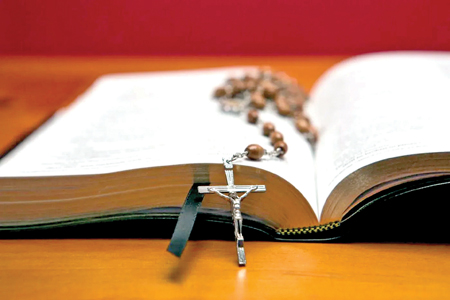Beginning today, Christians the world over will observe Holy Week, also known as Heavy Lent, which will culminate in Good Friday – reflecting on the crucifixion of Jesus Christ, the Son of God. Churches throughout the country will mark Holy Week with all the traditional observations which will extend to Maundy Thursday – the day prior to Good Friday, where the Washing of the Feet will take place in a symbolic – re-enactment of the scene where Christ washed the feet of his disciples moments before His betrayal by Judas to the Roman soldiers.
The Bible says his disciple and friend Judas betrayed Jesus’ whereabouts in the Garden Gethsemane. He was arrested and taken to the house of Caiaphas, the high priest, which was an informal late-night meeting of the Sanhedrin, the Jewish ruling council. They had plotted to put Jesus on trial. They were looking for evidence that would justify putting Him to death, but they could not find any.
Finally, the high priest demanded Jesus, “Tell us if you are the Messiah, the Son of God.” Jesus then replied, “I am, and you will see me, the Son of Man, sitting at God’s right hand and coming back on the clouds of heaven.” Then the high priest said, “You have just heard His blasphemy! Why do we need any more witnesses? What is your verdict?” They all shouted, “He deserves death!”
Mock trial
 Then they spat in Jesus’ face and started beating Him. After he was convicted in their mock trial, they took Him to Pilate because they did not have the authority to put anyone to death under Roman law. They falsely accused Jesus of treason against the Roman Empire for claiming to be the king of the Jews and for urging people not to pay their taxes. However, Pilate knew Jesus was not guilty of any crime; yet the mob wanted Him crucified. So, he washed his hands of it and did what the crowd wanted.
Then they spat in Jesus’ face and started beating Him. After he was convicted in their mock trial, they took Him to Pilate because they did not have the authority to put anyone to death under Roman law. They falsely accused Jesus of treason against the Roman Empire for claiming to be the king of the Jews and for urging people not to pay their taxes. However, Pilate knew Jesus was not guilty of any crime; yet the mob wanted Him crucified. So, he washed his hands of it and did what the crowd wanted.
On His way to His death, Christ was humiliated, slapped, whipped and spat on. Yet He forgave His tormentors while being nailed to the Cross saying “Father, forgive them for they do not know what they do”. The movie Ben Hur contains a moving scene where one man who is unable to see Christ suffering in this manner gives him water.
At the time, crucifixion was the cruelest form of death reserved for criminals and slaves. Jesus, the son of God was flogged and ordered to carry a cross that he would die upon. After he was nailed to the Cross, he was given a crown of thorns and the title as “King of the Jews.” The Cross was placed between two other men who were being crucified that day. The soldiers nailed Jesus to the cross and left Him to die. They put a sign on the Cross to mock Jesus that said, “Jesus of Nazareth, the King of the Jews.” Jesus struggled on the cross for six hours, and according to the Bible, when he eventually gave up his spirit darkness fell across the land.
Good Friday is also the culmination of 40 days of acts of penance and mortification by Christians that began on Ash Wednesday, reminiscent of Christ’s 40 days of fasting in the wilderness. During the period, Christians, particularly the Catholics, forgo heavy meals and endure discomfort and hardship in a bid to get as much closer to that which was endured by Christ in the days and hours leading to His Crucifixion. They also undertake pilgrimages to places particularly known for their significance associated with Lent, most notably by participating in the Way of the Cross at the earmarked locations in Payagala, Mawathagama and Hiniduma reminiscing Christ’s journey to Mount Calvary to be crucified. Such re-enactments can be seen in many other countries.
The Holy Week is also notable for the staging of Passion Plays particularly in the coastal towns of North Western Province with a preponderance of Catholics and churches. Most of these plays were creations of the legendary Fr. Marcelline Jayakody who also picked the performers mostly from among the fishing community in these areas who are also known to mark Good Friday introducing their own forms and practices. Fr. Jayakody was also known as the “Pansale Piyathuma” due to his close association with the Buddhist clergy. He has also written many original Sinhala songs.
Extreme devotion
Easter Sunday that follows Good Friday is the most significant event in the Roman Catholic Calendar which forms the basis of the Christian faith – namely, the Resurrection of Christ from death. This is why Christians observe the 40-day period with extreme devotion and sacrificial penance undergoing much hardship to signify the importance of the event.
For Christians, all their faith hinges on this one particular happening – the Resurrection. The Church too constantly reminds the faithful of the significance of the event. Regular Holy Masses are held in churches together with the Way of Cross in the period leading to Good Friday. In most Catholic areas, a wooden cross draped in a purple surplice is also circulated among the homes by the Churches – where the families and groups pray before it in extreme devotion.
The period is also noteworthy for Confessions where the faithful expiate their sins by making a clean breast of their wrongdoings to the priests- purely as a cleansing process in preparation for the momentous event. Other acts of sacrifice and penance too see a marked increase as Good Friday approaches.
The three hours Good Friday Service, of course, is the culmination of all that was endured for a period of 40 days where the churches take great pains to re-enact the Passion of the Christ as far as possible. This includes bringing down from a wooden cross a life sized statues of a crucified Christ which is taken around the church for veneration and, thereafter, placed in a casket for devotees to pay personal homage. There is a palpable lull following the Good Friday services, where the faithful wait with much anticipation for the dawning of Easter Sunday that would reinforce their faith in Christ and His timeless message.
Love for sinners
There is, of course, a debate regarding the term “Good Friday” because nothing really good happened on that day. But historian D.A. Carson offers this point of view: “It was not nails that held Jesus to that wretched cross; it was his unqualified resolution, out of love for his Father, to do his Father’s will—and it was his love for sinners like me. It is a good day because he traded places for you and for me. It is a good day because it was the day he conquered sin and death so that we will never be apart from God on this side of heaven or the other.
If you had asked his friends, family, and disciples on the day he died, they wouldn’t have said it was a good day when all hope seemed lost; evil and death seemed to have triumphed, but their responses would’ve been very different three days later because the forces of evil had been defeated, death had been destroyed, and from that point on, we all have a way to be free of sin and death.”
As per another interpretation, the word “good” originally meant “holy” in Old English, so “Good Friday” could be synonymous with “Holy Friday” or “God’s Friday.” This argument makes a lot of sense, according to an expert, if we take into account the other names for Good Friday, such as “Sacred Friday” (Roman languages) or “Passion Friday” (Russian).
The day is referred to as Good Friday in context to the holiday’s ties to Easter Sunday, which celebrates the resurrection of Christ. Because Jesus couldn’t have been resurrected without dying, so the day of his death is, in a sense, “good.”
Even though the Bible doesn’t tell us to celebrate Good Friday, we observe it and call it Good Friday because it was a good day for humankind. God demonstrated his love for us through the perfect sacrifice of Jesus. “But God demonstrates his own love for us in this: While we were still sinners, Christ died for us.” 1 Peter 3:18 tells us, “For Christ died for sins once for all, the righteous for the unrighteous, to bring you to God. He was put to death in the body, but made alive by the Spirit.”
No matter how you choose to observe it, knowing the story of Good Friday causes our hearts to cry out to God in humility and thanksgiving. It is a day that is holy and makes us holy because God was drawing the world to God’s self in Christ.
May we never forget what Christ did for us. Like a lamb to the slaughter, clothed in humility and grace, he willingly offered himself to death so that we might live forever. We are truly thankful for the extent of his love, stretched out on a cruel wooden cross. We come to you in repentance and reconciliation and forgiveness. Through the power of the cross, you have redeemed us. May we not dwell on our sufferings, but leave them at your feet, trusting that You know what’s best for us.
The crucifixion lays bare the reality about the human experience and human suffering: that all societies are founded on violence and that, most of the time anyway, we turn our violence on the innocent. If the crucifixion story tells us an unbelievable story about God, it tells us a very believable story about man: that we are violent and cruel. The crucifixion shows us the humility of God, and also teaches us some humility. It shows us that, precisely because he became lower than us, God is better than us.







